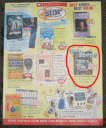 The Gay Uncle recently read about an interesting campaign. It appears that an organization called the Campaign for a Commercial Free Childhood has taken on the popular purveyor of smudgy, colored newsprint, The Scholastic Book Club, for having too many non-book offerings in its monthly sales circular–which is distributed to roughly three-quarters of our nation’s elementary school teachers. There was all sorts of other stuff in there, including toys, games, stickers, craft kits, and other cheap trinkets. Some of it apparently came as a bonus prize with a book, as an attempt to lure kids inl. But much of it was straightforward salesmanship of…well, toys, games, craft kits, and other cheap trinkets. Now, you know that Gunc is a firm believer in kids’ rights to Junk–snacks, sweets, TV, and movies. But you’ll also note that he’s also a firm believer in the idea that these should be distributed in an appropriate, proscribed and monitored environments. And while schools are a great place to try to sell kids educational items like books, The G.U. doesn’t really think the classroom is this environment. If Scholastic wants to include books of crossword puzzles or the dreaded, waiting-for-death-but-somehow-math-y Sudoku in their offerings, fine. But it’s a BOOK club. Stop sneaking other shit in there under your book-related imprimatur. That said, the current catalogs are a perfect opportunity for teachers and parents to help kids learn about Commercial Creep–the way in which every aspect of our culture is being invaded by advertising and consumer messaging–and how they can notice and counteract it. Discuss the fact that this is a Book Club, and then have them take the broadsheet and cross off all the products that don’t seem to fit in this category, then you can talk about why they made the decisions they did. Remember: moments of engaged exploration and elucidation enhance long-term understanding for kids much more than simple moments of flat-out rejection.
The Gay Uncle recently read about an interesting campaign. It appears that an organization called the Campaign for a Commercial Free Childhood has taken on the popular purveyor of smudgy, colored newsprint, The Scholastic Book Club, for having too many non-book offerings in its monthly sales circular–which is distributed to roughly three-quarters of our nation’s elementary school teachers. There was all sorts of other stuff in there, including toys, games, stickers, craft kits, and other cheap trinkets. Some of it apparently came as a bonus prize with a book, as an attempt to lure kids inl. But much of it was straightforward salesmanship of…well, toys, games, craft kits, and other cheap trinkets. Now, you know that Gunc is a firm believer in kids’ rights to Junk–snacks, sweets, TV, and movies. But you’ll also note that he’s also a firm believer in the idea that these should be distributed in an appropriate, proscribed and monitored environments. And while schools are a great place to try to sell kids educational items like books, The G.U. doesn’t really think the classroom is this environment. If Scholastic wants to include books of crossword puzzles or the dreaded, waiting-for-death-but-somehow-math-y Sudoku in their offerings, fine. But it’s a BOOK club. Stop sneaking other shit in there under your book-related imprimatur. That said, the current catalogs are a perfect opportunity for teachers and parents to help kids learn about Commercial Creep–the way in which every aspect of our culture is being invaded by advertising and consumer messaging–and how they can notice and counteract it. Discuss the fact that this is a Book Club, and then have them take the broadsheet and cross off all the products that don’t seem to fit in this category, then you can talk about why they made the decisions they did. Remember: moments of engaged exploration and elucidation enhance long-term understanding for kids much more than simple moments of flat-out rejection.
One Reply to “Scholasticized”
Comments are closed.
Good one – I like the opportunity to do some critical thinking with the kids.